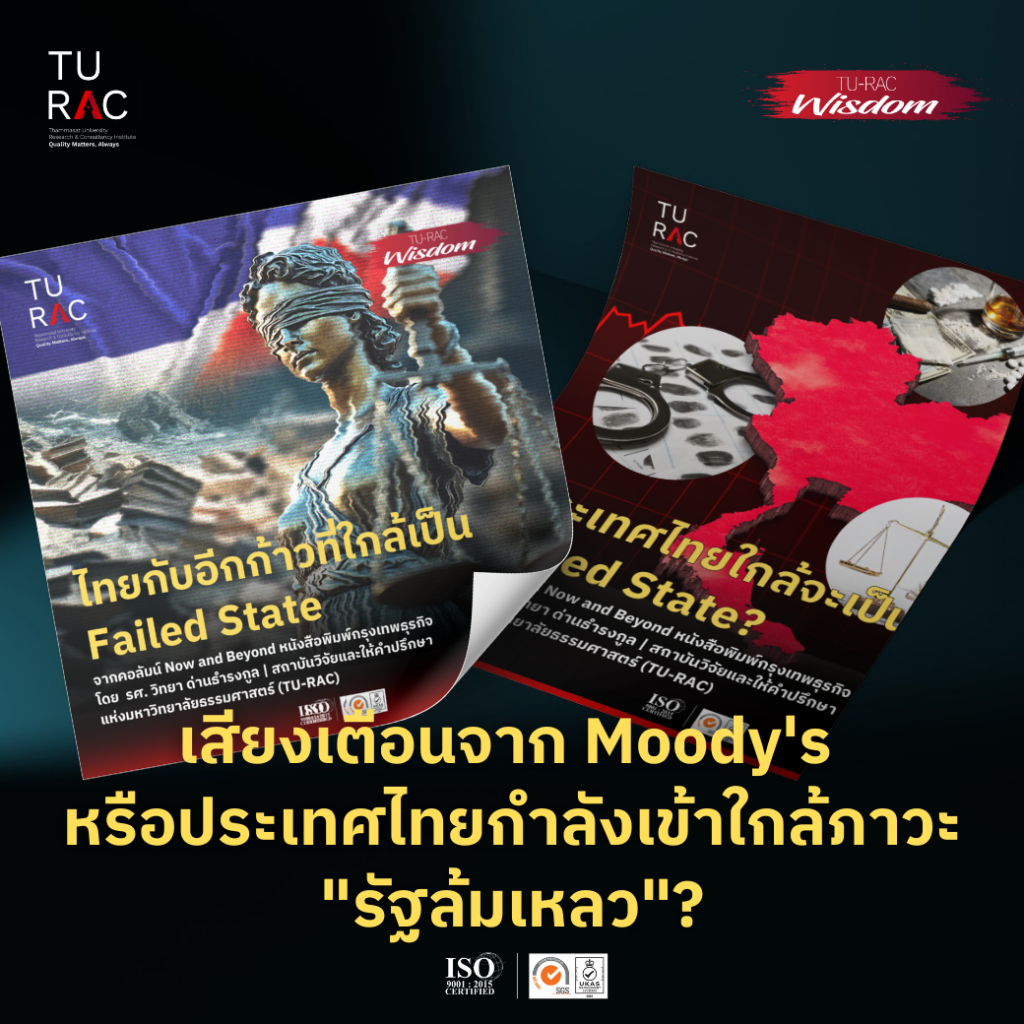การปรับลดแนวโน้มอันดับเครดิตของประเทศไทยจาก “Stable” เป็น “Negative” โดยสถาบันจัดอันดับความน่าเชื่อถือ Moody’s เมื่อปลายเดือนเมษายน 2568 ไม่ได้เป็นเพียงการประเมินเชิงเทคนิคทางการเงินเท่านั้น หากแต่เป็น “สัญญาณเตือน” ที่ชี้ถึงความเปราะบางเชิงโครงสร้างของประเทศไทย ซึ่งสะสมมาเป็นเวลานาน และอาจนำพาประเทศไปสู่ภาวะที่เลวร้ายที่สุด — “รัฐล้มเหลว (Failed State)”
Moody’s ให้เหตุผลว่า ความอ่อนแอของเศรษฐกิจไทย ภายใต้แรงกดดันจากความไม่แน่นอนทางการค้าระหว่างประเทศ ความล่าช้าในการฟื้นตัวทางเศรษฐกิจหลังโควิด และความเสี่ยงด้านเสถียรภาพการคลัง ล้วนเป็นตัวเร่งให้ความน่าเชื่อถือของรัฐลดลง ในขณะเดียวกัน “ความไร้เสถียรภาพทางการเมือง” และ “ความไม่ชัดเจนของนโยบาย” เป็นปัจจัยเชิงสถาบันที่ Moody’s กังวลเป็นพิเศษ
สอดคล้องกับบทความวิเคราะห์ของ รศ. วิทยา ด่านธำรงกูล คอลัมน์ Now and Beyond by TU-RAC ทุกวันพฤหัสบดี ในหนังสือพิมพ์กรุงเทพธุรกิจ ที่ระบุอย่างตรงไปตรงมาว่า ประเทศไทยกำลังเดินหน้าเข้าสู่ภาวะ “รัฐล้มเหลว” จากมิติการเมืองที่อ่อนแอ การใช้อำนาจรัฐอย่างไม่โปร่งใส การบังคับใช้กฎหมายที่เลือกปฏิบัติ และการขาดฉันทามติร่วมของสังคม
มิติศรษฐกิจที่ไม่เท่าเทียม ความเหลื่อมล้ำทางรายได้ที่รุนแรง การเติบโตทางเศรษฐกิจที่กระจุกตัว และการขาดแคลนการลงทุนระยะยาว
มิติสังคมที่แตกร้าว การอพยพของคนรุ่นใหม่ ภาวะสมองไหล และความสิ้นศรัทธาในอนาคตของประเทศ
เมื่อมองจากมุมของต่างชาติ อย่าง Moody’s ประเทศไทยไม่ได้เพียงแต่เผชิญความเสี่ยงทางเศรษฐกิจ หากยังตกอยู่ในภาวะเปราะบางทางสถาบันซึ่งเป็นรากฐานของการบริหารจัดการรัฐ
คำถามสำคัญคือ เรากำลังมองเห็นเพียง “รอยร้าว” หรือกำลังยืนอยู่บน “ขอบเหว” ของรัฐล้มเหลว?
ประเทศไทยยังมีโอกาสเปลี่ยนทิศ แต่จะต้องเริ่มจากการยอมรับ “ข้อเท็จจริง” และกล้าเผชิญ “ความจริง” ว่าระบบที่มีอยู่กำลังพาประเทศไปสู่จุดเสี่ยง หากยังเพิกเฉยต่อเสียงเตือนเหล่านี้ สถานะ “Failed State” ก็อาจไม่ใช่คำเปรียบเปรยอีกต่อไป
A Warning from Moody’s: Is Thailand Approaching a Failed State?
Moody’s recent decision at the end of April 2025 to revise Thailand’s credit outlook from “Stable” to “Negative” is not merely a technical financial assessment. It serves as a critical warning signal—an indication of deep-rooted structural vulnerabilities that have accumulated over time and may ultimately push the country toward its worst-case scenario: becoming a Failed State.
Moody’s cited concerns over Thailand’s weakening economic fundamentals under pressure from global trade uncertainty, slow post-COVID economic recovery, and rising fiscal instability. Compounding this are political instability and policy ambiguity, institutional risks that Moody’s emphasized as especially troubling.
These concerns resonate with an analysis by Associate Professor Witaya Danthamrongkul published in his weekly column Now and Beyond by TU-RAC in Bangkok Biz News. He states plainly that Thailand is edging closer to the status of a failed state, driven by three interlinked crises:
Political dysfunction – marked by non-transparent governance, selective law enforcement, and a lack of national consensus;
Economic inequality – with extreme income disparity, highly concentrated growth, and insufficient long-term investment;
Social fragmentation – seen in the mass exodus of young talent, a worsening brain drain, and a growing disillusionment with the nation’s future.
From the international perspective—as reflected in Moody’s assessment—Thailand is not only facing economic risk, but is also institutionally fragile, which undermines the very foundations of state governance.
The critical question now is: are we merely seeing “cracks,” or are we already standing at the edge of a cliff?
Thailand still has the chance to change course—but only if it begins by confronting the facts and acknowledging the truth: the current system is leading the country down a dangerous path. If these warnings continue to be ignored, “Failed State” may no longer be a metaphor, but a looming reality.
Read the full article for more insights :
: https://www.bangkokbiznews.com/blogs/business/economic/1163445?fbclid=IwY2xjawKBUwJleHRuA2FlbQIxMABicmlkETF2blBZbUZkZnlzU0tSeDlLAR6OZ4ypxINZTMGTIEjoDoEm7Y-HPNdeD49aL8HD7atyc17OGobFbce4bOUSMA_aem_brGn6E4Dfg_V0UUbfLZkwg และ https://www.bangkokbiznews.com/politics/1165664?fbclid=IwY2xjawKBVVhleHRuA2FlbQIxMABicmlkETF2blBZbUZkZnlzU0tSeDlLAR7bb0X5XxiDhpikzoGOBOTIVh1kZW3-NozNe7B1fmzKDxDVGeDOwAwaG2e0iA_aem_Xk_Fyc5EGSOOrc2rjSxSgw



